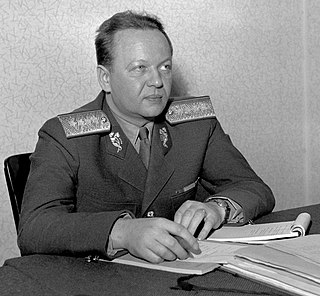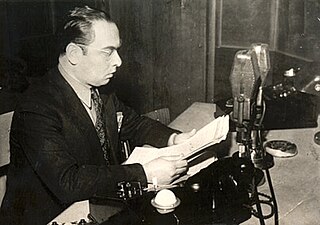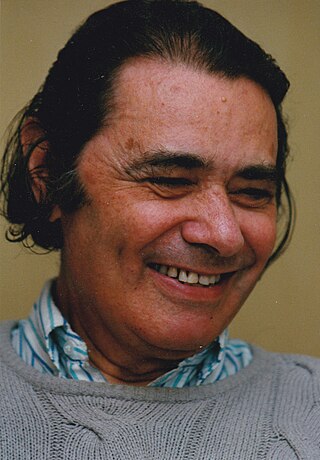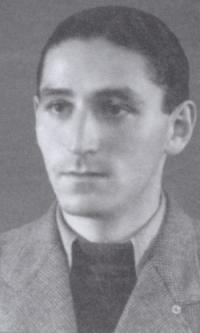Toman Brod | |
|---|---|
 | |
| Born | 18 January 1929 |
| Occupation | Historian |
| Genre | Non-fiction, History |
Toman Brod (born 18 January 1929) is a Czech historian, Holocaust survivor, and former member of the Communist Party turned anti-communist dissident.
Toman Brod | |
|---|---|
 | |
| Born | 18 January 1929 |
| Occupation | Historian |
| Genre | Non-fiction, History |
Toman Brod (born 18 January 1929) is a Czech historian, Holocaust survivor, and former member of the Communist Party turned anti-communist dissident.
Brod was born in Prague on 18 January 1929 to an assimilated Jewish family, [1] [2] who lived in an apartment near the Vltava river. [3] Before World War II, Brod considered himself to be Czech, but following the Munich Agreement and the Nuremberg Laws, he felt like he did not belong anywhere. As it became more difficult for Jewish citizens to do everyday activities, the Brods received help from their longtime cook, Anna Kopská, and some other Christians.
On 27 July 1942 Brod was deported to Terezín along with his brother and mother. Brod lived in one of the boys' dormitories and attended school classes, in which the teachers attempted to protect the children from the reality of life in the ghetto. [3] Brod and his brother were able to visit their mother most afternoons. Kopská sent care packages to the family while they were in Terezín. In 1943, Brod was deported to Auschwitz, where he was assigned to a children's bunk in the Family Camp. The liquidation of the family camp was scheduled for June, [4] six months after their arrival. The boys were sentenced to die, but Josef Mengele selected some of the boys for work, including Brod. He subsequently escaped Auschwitz by sneaking onto a transport with his friends to the Gross-Rosen Camp. [3]
After liberation, Brod returned to Prague, the only member of his family to survive the Holocaust, and lived with Anna Kopská. He then went on to study at university, and graduated with a degree in history. He joined the Communist Party in 1948. While at university, Brod met his future wife, Libuše Kvasničková. After marrying, they continued to live with Kopská. In 1955, Brod got a job at the Military History Institute, during which time Brod became disillusioned with the Communist Party and attempted to subvert it, [5] conducting independent research into the activities of the Czechoslovak resistance during World War II, which resulted in him experiencing trouble with the government. [3] He was eventually expelled from the Party and fired from his job, after which he worked as a water pumper, [6] which was a miserable experience for him. He eventually received disability status and was able to live at home. During this time, a friend asked him to sign Charter 77, which he did, [7] as one of the 150 original signatories of the charter. Brod and his wife spoke open of their anti-Soviet views and participated in many political demonstrations, despite their apartment being wired by the StB. Around this time Brod began to share his story; his daughter married a Jewish man from the United States, which caused her to be more interested in her father's past, pressuring him to write down his memories. He also began taking others to visit Terezín.
Brod resumed writing historical essays after the end of the communist regime in Prague. He wrote a book about his life called Ještě že člověk neví, co ho čeká ("A man never knows what's coming") Toman has been interviewed by organisations including Centropa and Post Bellum. He frequently speaks about the Holocaust. A documentary film was made by students about his life and experiences.
| Year Published | Title | Genre |
|---|---|---|
| 1961 | Pražské květnové povstání 1945 | Non-fiction, Textbook |
| 1965 | Na západnom fronte | Non-fiction, History |
| 1965 | Nastal čas boje | Non-fiction, History |
| 1990 | Operace Velký podvod | Non-fiction, History |
| 1990 | Pakty Stalina s Hitlerem | Literature didactic |
| 1991 | Triumf a zkáza | Non-fiction, History |
| 2002 | Osudný omyl Edvarda Beneše 1939 - 1948 | Non-fiction, History |
| 2007 (German version in 2012) | Ještě že člověk neví, co ho čeká | Non-fiction, Biography |
| 2008 (first edition 1961) | Tobrucké krysy | Literature didactic |

Terezín is a town in Litoměřice District in the Ústí nad Labem Region of the Czech Republic. It has about 2,800 inhabitants. It is a former military fortress composed of the citadel and adjacent walled garrison town. The town centre is well preserved and is protected by law as an urban monument reservation. Terezin is most infamously the location of the Nazis' notorious Theresienstadt Ghetto.

Vedem was a Czech-language literary magazine that existed from 1942 to 1944 in the Terezín concentration camp, during the Holocaust. It was hand-produced by a group of boys living in the Home One barracks, among them editor-in-chief Petr Ginz and Hanuš Hachenburg. Altogether, some 800 pages of Vedem survived World War II.

Petr Ginz was a Czechoslovak boy of partial Jewish background who was deported to the Theresienstadt concentration camp during the Holocaust. He was murdered at the age of sixteen when he was transferred to Auschwitz concentration camp and gassed to death upon arrival. His diary was published after his death.

George Jiri Brady was a Holocaust survivor of both Theresienstadt (Terezín) and Auschwitz, who became a businessman in Canada and was awarded the Order of Ontario in 2008.

General Alexej Čepička was a Czechoslovak communist politician who served as defense minister from 1950 to 1956.

Miroslav Kárný was a historian and writer from Prague, Czechoslovakia.
Pavel Friedmann was a Jewish Czechoslovak poet who was murdered in the Holocaust. He received posthumous fame for his poem "The Butterfly".

František R. Kraus was a Czechoslovak Jewish anti-fascist writer, journalist and editor, member of the resistance movement, sportsman and a known Czech holocaust survivor.

Norbert Frýd was a Czech writer, journalist and diplomat. He is known mainly for his autobiographical novel Krabice živých, in which he describes his experiences in Nazi concentration camps. During World War II, he was imprisoned in the Theresienstadt, Auschwitz and Dachau-Kaufering concentration camps.

Helga Hošková-Weissová, also Helga Weiss, is a Czech artist, and a Holocaust survivor. She is known for her drawings that depict life at Terezín and her diary, which was published in 2013.

Erich Kulka was a Czech-Israeli writer, historian and journalist who survived the Holocaust. After World War II, he made it his life's mission to research the Holocaust and publicize facts about it.

Pavel Bergmann was a Czech historian, philosopher, a signatory of the Charter 77 manifesto, and a founding member of the Civic Forum.

The Stolpersteine in the Kraj Vysočina lists the Stolpersteine in the Vysočina Region in the south-east of Bohemia. Stolpersteine is the German name for stumbling blocks collocated all over Europe by German artist Gunter Demnig. They remember the fate of the Nazi victims being murdered, deported, exiled or driven to suicide.

Alfred Hirsch was a German-Jewish athlete, sports teacher and Zionist youth movement leader, notable for helping thousands of Jewish children during the German occupation of Czechoslovakia in Prague, Theresienstadt concentration camp, and Auschwitz. Hirsch was the deputy supervisor of children at Theresienstadt and the supervisor of the children's block at the Theresienstadt family camp at Auschwitz II-Birkenau.
Valtr Eisinger was a Czech teacher and resistance fighter at Theresienstadt concentration camp. There, he made possible the publication of the magazine Vedem that consisted of poems, stories and drawings from young people, aged twelve to fifteen. He was murdered by the Nazi regime on one of the death marches.

Toman is a 2018 Czech historical film by Ondřej Trojan. It focuses on Zdeněk Toman, who led Czechoslovak intelligence from 1945 to 1948. It premiered at Slavonice Film Festival on 2 August 2018.

Felix Kolmer was a Czech physicist of Jewish origin, specialising in the field of acoustics. During the Second World War, he was active in the Czech Resistance.

The Theresienstadt family camp, also known as the Czech family camp, consisted of a group of Jewish inmates from the Theresienstadt ghetto in Czechoslovakia, who were held in the BIIb section of the Auschwitz II-Birkenau concentration camp from 8 September 1943 to 12 July 1944. The Germans created the camp to mislead the outside world about the Final Solution.

Anna Hyndráková was a Czech historian. She worked at the Jewish Museum in Prague. In addition to escaping from the labour camp Gorlitz, Anna Hyndráková also survived in both forced labour and concentration camps during World War II, including the Theresienstadt Ghetto and camps at Gorlitz, Auschwitz, Niesky, and Christianstadt.